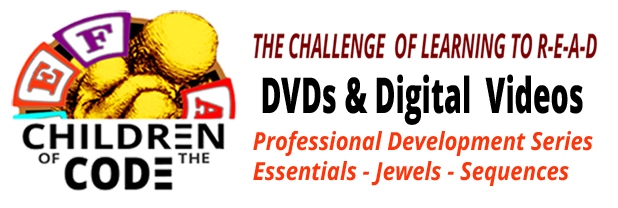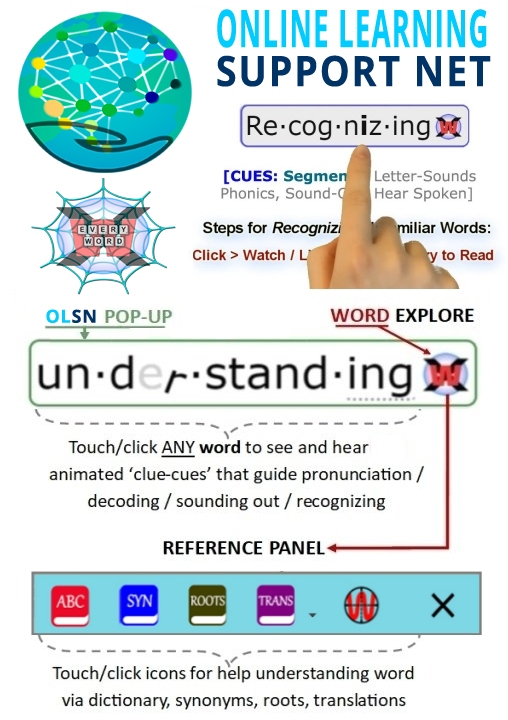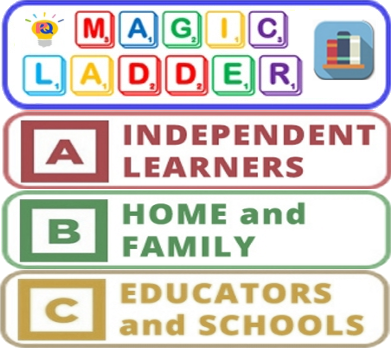Vocabulary and Reading
So, you’ve got kids coming into pre-school, kindergarten and first grade who are already behind the curve in vocabulary. Even if we could teach them to read print, what are they going to relate it to? – Dr. G. Reid Lyon, Past- Chief of the Child Development and Behavior Branch of the National Institute of Child Health & Human Development, National Institutes of Health, Current senior vice president for research and evaluation with Best Associates. Source: COTC Interview – http://www.childrenofthecode.org/interviews/lyon.htm#ImpoverishedVocabulary
It turns out that I can’t play phonemic awareness games when the word’s aren’t in my vocabulary…. I can’t do it. I can’t catch the syllables, I can’t catch the phonemes. – Dr. Marilyn Jager Adams, Chief Scientist of Soliloquy Learning, Inc., Author of Beginning to Read: Thinking and Learning About Print. Source: COTC Video Interview (Unpublished) COTC Phone Interview – http://www.childrenofthecode.org/interviews/adams.htm
Note: Remember to click on any word on this page to experience the next evolutionary step in technology supported reading.
What Does it Take to Learn to Read?
If I had my druthers, instructional methods wouldn’t be the big deal out there. What would be the big deal is if teachers could ask themselves what does it take to learn to read? It takes phonemic awareness, it takes phonics, it takes the rapid application of those print level skills to text – fluency, it’s called. Even when they do all of those kinds of things, phonemic awareness and phonics and fluency, if kids don’t have vocabulary they won’t understand what the heck they’re reading. So, they’ve got to have vocabulary.
G. Reid Lyon, Past- Chief of the Child Development and Behavior Branch of the National Institute of Child Health & Human Development, National Institutes of Health, Current senior vice president for research and evaluation with Best Associates. Source: COTC Interview – http://www.childrenofthecode.org/interviews/lyon.htm#Teachersquestions
Vocabulary
Dr. Marilyn Jager Adams: ‘The boy kissed the ji-girl.’ That’s the way it’s supposed to work. But if the word is not in your vocabulary, you go, ji-uh-erl, jurl, jurl.
David Boulton: Right. So we’ve got whatever is going on at the decoding level, we’ve got comprehension at the other end, we’ve got to have…
Dr. Marilyn Jager Adams: Vocabulary.
David Boulton: The vocabulary has to be there.
Dr. Marilyn Jager Adams: Right.
Marilyn Jager Adams, Chief Scientist of Soliloquy Learning, Inc., Author of Beginning to Read: Thinking and Learning About Print. Source: COTC Interview – http://www.childrenofthecode.org/interviews/adams.htm#Vocabulary
Vocabulary and Reading
Children who don’t have the underlying knowledge of vocabulary or cultural background have to not only make sense of the code, but also make sense of the words. Their lack of certainty about what the words mean gets in the way of their sense of assurance that the code has been cracked. So, these two problems support each other and together contribute to the child’s sense that something is wrong here.
So, you need not only the code breaking exercises and all the practice that involves becoming fluent with that, but the experience with oral language and understanding what words mean in the conversations one has with other educated people and parents and teachers to be able to collect the knowledge of words and their meaning and understanding of the way the world works to disambiguate those aspects of the printed text as well.
Grover (Russ) Whitehurst, Ex-Director (2002-08), Institute of Education Sciences, U.S. Department of Education. Source: COTC Interview: http://www.childrenofthecode.org/interviews/whitehurst.htm#UnnaturalDisambiguation
Early Parent-Child Interactions and Early Literacy Development
Walker and her colleagues (1994) found that children’s vocabulary at age 3 years predicted their school achievement levels (reading and spelling) in kindergarten through third grade.
Beverly J. Dodici, Dianne C. Draper, Carla A. Peterson, Topics in Early Childhood Special Education, Fall, 2003 Source: Early parent-child interactions and early literacy development.
Vocabulary Correlations with Third Grade Tests
We followed these kids into the third grade. And you know what the third grade is because that’s the break point in terms of literacy. It’s in third and fourth grade that symbols begin to be the curriculum.The relationship of what we saw parents doing, the extra talk before the age of three, and the Peabody picture vocabulary test scores at age nine when they were in the third grade is .77.
Todd Risley, Professor Emeritus of Psychology at the University of Alaska. Co-Author “Meaningful Differences in the Everyday Experience of Young American Children.” Source: COTC Interview – http://www.childrenofthecode.org/interviews/risley.htm#CorrelationswithThirdGrade
Impoverished Vocabulary
You know, if we just go back to the little kids we start with…now we’re starting at birth, as I mentioned, and by three years of age kids from poverty, disadvantaged, whatever their race or ethnicity, are already 30-40% percent behind in vocabulary development. You know, whereas your kids and my kids are going to learn about nine new words a day from eighteen months of age onward, kids from disadvantaged are going to learn about three. Now what happens is, they’re not learning or picking up the vocabulary, but they’re also not getting those interactions that stimulate brain, that help kids understand that our language is composed of smaller units, and we can talk about how that is so important for reading development. So, you’ve got kids coming into pre-school, kindergarten and first grade who are already behind the curve in vocabulary. Even if we could teach them to read print, what are they going to relate it to?”
G. Reid Lyon, Past- Chief of the Child Development and Behavior Branch of the National Institute of Child Health & Human Development, National Institutes of Health, Current senior vice president for research and evaluation with Best Associates. Source: COTC Interview – http://www.childrenofthecode.org/interviews/lyon.htm#ImpoverishedVocabulary
Insufficient Oral Language Experiences
As we talk about the development of literacy skills, certainly we can’t neglect vocabulary development, oral language experience. It’s probably one of the most difficult areas to work in and it’s the one subject with the least amount of control. Most of it is not in the classroom; it’s out of the classroom. And it’s oral, it’s not written; very difficult to control.”
James Wendorf, Executive Director, National Center for Learning Disabilities. Source: COTC Interview –http://www.childrenofthecode.org/interviews/wendorf.htm#InsufficientOralLanguageExperiences
Head Start Family and Child Experiences Survey (FACES)
Programs should stress educational activities that promote children’s development of increasingly varied and complex vocabularies. Vocabulary has been shown to predict strongly children’s later general knowledge and comprehension skills. Reading to children in small groups with the promotion of discussion about stories, conversations with children, word games, and exposure to an increasingly wide variety of experiences can help to develop vocabulary. Encouraging parents to read to children daily using an interactive style is also important.
Ruth Hubbell McKey, Winter 2003 (The author represents the FACES study research team)
Language-Rich Home and School Environments Are Key to Reading Success
The Home-School Study also documented a strong connection between early reading success among children and the amount of “decontextualized” talk they engage in with adults, in both homes and preschools.
The study has shown that the level of vocabulary present in adult talk to children who are three and four years old, in the home setting and in preschools, is a strong predictor of the level of vocabulary that child will have attained by second grade. In other words, children who are exposed to more words in their conversations with adults, and more unusual words, tend to develop larger vocabularies.
Leon Lynn, Harvard Education Letter Source: http://www.edletter.org/past/issues/1997-ja/language.shtml
Vocabulary Enters Through Print
Consider the kids who we don’t get to who still are having print problems that are labored, hesitant, and inaccurate as they come up through second grade, third grade, and fifth grade. Well, after fourth grade, or during fourth grade and beyond, vocabulary now enters through print. It doesn’t enter through hanging out with your friends on the corner. So, now we start to get further behind in vocabulary, such that even when the kids are accommodated for, that is books are read to them through some platform or modality and they have some type of accommodations, they still do not have the background knowledge that should have been fostered by reading from day one and we have this constant trajectory of failure with the gap widening and widening.
G. Reid Lyon, Past- Chief of the Child Development and Behavior Branch of the National Institute of Child Health & Human Development, National Institutes of Health, Current senior vice president for research and evaluation with Best Associates. Source: COTC Interview – http://www.childrenofthecode.org/interviews/lyon.htm#VocabularyPrint
Reading Grows Vocabulary
David Boulton: So, it’s an exercise environment. Learning to read well, once you’re doing it, opens the door to this huge opportunity to exercise your intelligence that you don’t have if you can’t read.
Dr. Anne Cunningham: Right, and you won’t acquire the level of verbal intelligence in a technological society such as ours without print. That’s what is fascinating about this line of research is that people such as Hays and Aarons have looked at the oral versus print distributions of words and what you can readily see isthere are lexical items that are found in print that are not words we use in oral discourse. Because we tend to, as a society, dummy-down our language and so you would look pretentious if we began to use words such as dissipate or endeavor. Those are words that are found primarily in print.
So, where do you grow your vocabulary? You grow your vocabulary primarily in print (Fisher , Lyon) and not through oral discourse. And in order to become intelligent you have to engage in print. And so, so many children who didn’t break the break the code early, who don’t engage in it are shut out. They’re shut out of these opportunities to participate in a technological society such as ours.
Anne Cunningham, Director of the Joint Doctoral Program in Special Education with the Graduate School of Education at the University of California-Berkeley. Source: COTC Interview – http://www.childrenofthecode.org/interviews/cunningham.htm#ReadingExercisesIntelligence
Vocabulary Growth and Print
Then the other work that’s kind of a fun exploration is a paper that appeared in an IRA journal a few years ago by Lawrence Baines (From page to screen: When a novel is interpreted for film, what gets lost in translation. Journal of Adolescent & Adult Literacy, 39, 612-622.) What he did was to take text that had been made into movies, things like To Kill a Mockingbird, or something like that. He has the transcript of the movie, and then he has letter by letter – like here are all the words beginning with U in the movie, and here are all the words beginning with U in the book. Of course, one is a huge long list and the other is this emaciated list of fairly frequent words. And that’s important literature. Of course it’s tied to the print exposure literature that we are into, because as I said, if vocabulary is to grow beyond a certain point, by definition, there has to be exposure to words of a certain rarity.
Keith Stanovich, Canada’s Research Chair of Applied Cognitive Science at the Department of Human Development and Applied Psychology, University of Toronto. Source: COTC Interview – http://www.childrenofthecode.org/interviews/stanovich.htm#VocabularyGrowth
Matthew Effect of Reading on Vocabulary Development
In our study what we found was that children who made this break through, who broke the code early on in first grade, not only became better readers in high school, which is what we’d predict, but they engaged in print more. So, one of the phenomenal findings of this particular study was that ten years later we could see that those children who broke the code early on began this Matthew Effect, this cycle of engaging in print and because they engaged and were successful in it they enjoyed it and because they enjoyed it they had positive affect and so presumably they practice it more and more. Because they practice it more and more their vocabulary grew, their level of verbal intelligence increased and so when they came upon some complex ideas or complex words, vocabulary items they may not have known, they had the cognitive space to think about, well what does that word mean and then attach it to a similar word so that they can then build their lexicon in a way that allows them to progress through out time.”
Anne Cunningham, Director of the Joint Doctoral Program in Special Education with the Graduate School of Education at the University of California-Berkeley. Source: COTC Interview – http://www.childrenofthecode.org/interviews/cunningham.htm#DownwardSpiralofShame
Amount of Reading Can Predict Vocabulary
…The amount of reading a person does can predict vocabulary independent of the education that they’ve had.
Keith Stanovich, Canada’s Research Chair of Applied Cognitive Science at the Department of Human Development and Applied Psychology, University of Toronto. Source: COTC Interview – http://www.childrenofthecode.org/interviews/stanovich.htm#VocabularyGrowth













